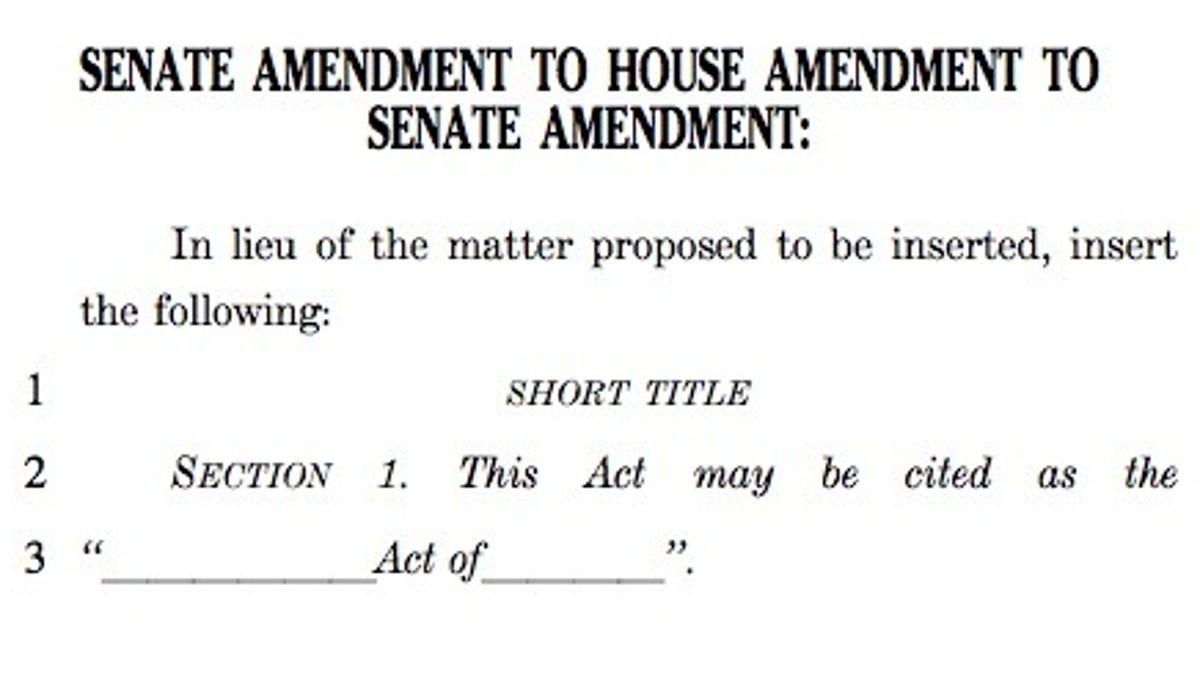Web watchdog spots unusual congressional gaffe
An apparent drafting error means that the House of Representatives will rush back to Washington this week to approve the "______Act of____." Whoops!
It was supposed to be some routine election-year largesse from Democrats: a $26 billion spending measure to aid two of the party's core constituencies, labor unions, and government workers.
But a watchdog Web site on Sunday evening spotted an unusual feature of the legislation, which the Senate approved by a 61-to-39 vote last week.
It doesn't actually have a name. Congress' official Web site calls it the "______Act of____" (PDF). Elsewhere, it's referred to as the "XXXXXX Act of XXXX."
Whatever the name, or no name, associated with the legislation, it may be too late to christen the bill properly. The Senate has left town until mid-September, and House Speaker Nancy Pelosi has called the House of Representatives back into session to vote on the same unidentified legislation.
"Congress seems always to be hurrying," Jim Harper, editor of WashingtonWatch.com, which first spotted the error, told CNET on Sunday. "When they haven't taken time to name a bill, you have to wonder how much care they've given to the billions of dollars of spending in the bill." (WashingtonWatch tracks the per-family cost of bills using the government's own calculations, which puts the cost of an energy bill at $13,446 and President Obama's health care legislation at $13,156.)
The problem for the Democratic leadership is this: if Pelosi chooses to give the "______Act of____" a name, the legislation would presumably have to be sent back to the Senate, which would delay the grants to states to fund teachers and other state government employees by over a month. (The text of the U.S. Constitution says that "every" federal law must be approved by both chambers, with no exceptions for minor variations.)
A six-week delay seems unlikely. Pelosi has stressed the urgency of the situation, saying last week that she is "calling members of the House back to Washington at the beginning of the week to pass this bill and send it to President Obama without further delay." And Obama has already listed it on WhiteHouse.gov's "pending legislation" Web page, which shows the bills he's planning to sign into law in the very near future.
"Expect more of the same when Congress funds the federal government for the coming fiscal year [which starts October 1]," says Harper, who is a former Capitol Hill aide who works at the Cato Institute and runs WashingtonWatch in his spare time. "The House was supposed to complete action on appropriations bills [by] June 30. So far, it has passed only two."
It may be possible for Pelosi to use a process known as an "enrollment corrections" bill, which surfaced in March as part of a flap over government funding of abortions. But it might still be a bit embarrassing to have to take such a step to baptize the "______Act of____," and will likely lend ammunition to critics who have called on members of Congress to actually read the bills before voting to enact them into law.
There is no requirement in the Constitution that bills be named, and the "______Act of____" is probably more memorable than a contrived acronym like the Patriot Act, or a bill introduced last month by Rep. Bobby Rush (D-Ill.). Rush's tongue-twister of a bill is called the Building Effective Strategies To Promote Responsibility Accountability Choice Transparency Innovation Consumer Expectations and Safeguards Act, or Best Practices Act.


